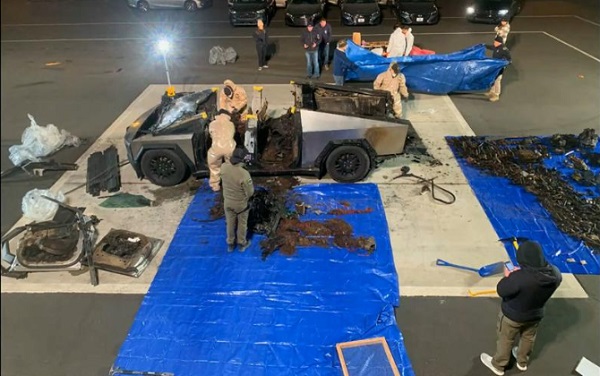Cybertruck used in Trump International Hotel explosion in Las Vegas Thursday, Jan. 2, 2025
From The Center Square
By
Law enforcement officials confirmed that 37-year-old former Army veteran Matthew Livelsberger, who lived in Colorado Springs, was behind the rented Cybertruck explosion at the Trump Hotel in Las Vegas.
Authorities confirmed that Livelsberger died by a self-inflicted gunshot wound prior to the explosion, which injured seven bystanders. Officials say there was no information as of Thursday connecting Livelsberger to a terrorist group.
The driver of the Cybertruck was identified as Master Sgt. Matthew Alan Livelsberger, a U.S. Army special operations soldier who originally enlisted in 2006 until 2012.
Livelsberger, who was on leave at the time of his death, served in the National Guard from March 2011 to July 2012 before joining the Army Reserve from July 2012 to December 2012. Livelsberger then entered the active-duty Army in December 2012.
Las Vegas Sheriff Kevin McMahill said at a news conference Thursday said his office is still waiting for DNA confirmation of the driver’s identity, and that the attack was unrelated at this time to the attack in New Orleans.
Livelsberger was the one identified driving the vehicle at each location as authorities retraced the route taken from Colorado to Nevada, McMahill said.
Officials stated that investigations into the explosion are underway.
The explosion occurred just before 9 a.m. on New Year’s Day near the hotel’s main entrance, and federal, state, and local authorities are jointly investigating.
FBI’s Denver field office, the Denver Field Division of the Bureau of Alcohol, Tobacco, Firearms and Explosives, and the Colorado Springs Police Department confirmed activity at a residential address in Colorado Springs related to the explosion in Las Vegas but no further information would be provided at that time.
Local authorities confirmed a detonator possessed by Livelsberger initiated the explosion, which included fire mortars and camp fuel canisters found stuffed into the back of the Cybertruck.
President-elect Donald Trump took to his social media platform, blaming President Joe Biden’s open border policy, “I said, many times during Rallies, and elsewhere, that Radical Islamic Terrorism, and other forms of violent crime, will become so bad in America that it will become hard to even imagine or believe.”
Investigators confirmed that the vehicle was driven from Colorado and arrived in Las Vegas around 7:30 a.m. on New Year’s Day. Livelsberger reportedly drove up and down Las Vegas Boulevard for about an hour before entering the valet area of the Trump Hotel.
Seven people were injured. Two were briefly hospitalized before being released, according to the Las Vegas Metropolitan Police Department. The department has issued increased officer presence across the community, including the Las Vegas strip.
This attack came on the same day as fifteen people were killed on Bourbon Street after a man plowed his car into a crowd.
Shamsud-Din Jabbar, 42, a U.S. citizen and U.S. Army veteran from Houston, rented the F-150 Lightning truck and improvised explosive devices that were found in both the truck and in two different locations in the French Quarter, body armor, and an ISIS flag hanging from the tailgate.
The two suspects behind the separate attacks used Turo, a rental car app, to book the vehicles used at both locations.
“After the attacks in New Orleans and Las Vegas, @NYPDPC and I have been in constant communication,” posted New York City Mayor Eric Adams on X.
The mayor said that while there were no immediate threats to the city at the time, the heightened security was “out of an abundance of caution.” He stated that the city will have heightened security and increased NYPD presence at relevant locations, including at Trump Tower and in Times Square.





















